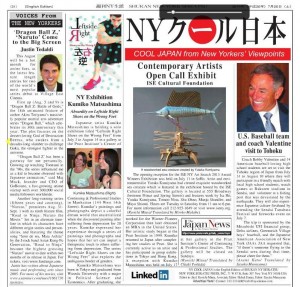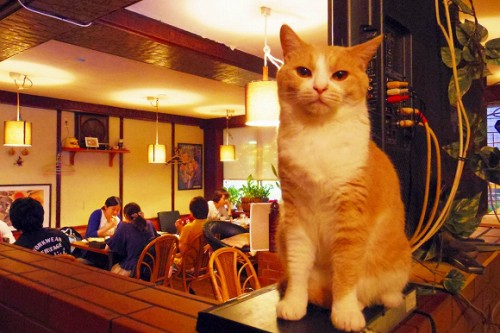JQ Magazine: JQ&A with Harry Hill, Chairman of CULCON

“My advice to the JETs is, don’t be afraid to take center stage and be memorable (of course in a respectful way), because these seemingly random relationships or encounters can be the source of great opportunity.” (Courtesy of Culcon.jusfc.gov)
By Alexis Agliano Sanborn (Shimane-ken, 2009-11) for JQ magazine. Alexis is a graduate of Harvard University’s Regional Studies—East Asia (RSEA) program, and currently works as an executive assistant at Asia Society in New York City.
As a martial artist, Monbusho Fellow, JET, consultant and CEO, there seems little that Harry Hill (Gifu-ken CIR, 1987-88) has not done or experienced when it comes to U.S.-Japan relations.
Now, Hill can add another feather to his cap: last February, the Japan-U.S. Friendship Commission and CULCON (the Conference on Cultural and Educational Interchange) in Washington, D.C. appointed him has their new chairman. For those familiar with Hill and his history, this appointment comes as no surprise: Hill knows Japan as intimately as he knows America. He began his career there as a Monbusho English Fellow in the mid-’80s and then served as a JET in Gifu Prefecture, experiences that helped him to tap into hitherto unexplored entrepreneurial sectors, in particular sports-related infomercials.
Since 2006, his company, Oak Lawn Marketing has been the largest infomercial brand in Japan. If you’ve seen Billy’s Bootcamp advertised there, you have Hill to thank for. Now back stateside, Hill uses his broad background in education, culture, business and non-profits to further strengthen interpersonal understanding between the U.S. and Japan. JQ caught up with Hill at his new digs—asking about life, opportunities and the risks that inevitably lead to his success.
Could you explain your background with Japan?
I developed a passion for martial arts, budo, and Shorjinji Kempo, in particular, during my time at college. This passion creates a curiosity and interest in Japan. During the summer of my sophomore year, I spent several weeks imagining my future. One of the books that influenced me at the time was Japan as Number One by Ezra Vogel. Looking around my immediate peers and acquaintances, I knew very few people who knew about Japan or could be considered Japan experts. Yet, many smart and respectable people were stating that Japan and Asia was the next land of opportunity. So I decided to start Japanese language training in my junior year with the intent of finding opportunity in Japan.
How did your time as a Monbusho English Fellow and JET lead to a career as an entrepreneur?
I was an MEF in Gifu Prefecture from 1985-1987 and the first CIR in Gifu during the first year of the JET Program from 1987-1988. As an MEF, I worked at both the kencho and kyoiku center. At the kyoiku center I helped put together teacher training programs for English teachers. In my two years in Gifu, I probably met and helped with training probably almost every junior high school or high school teacher in Gifu. I was also essentially a one-shot teacher. During my two year stint, I visited something like 230 of about 240 junior high schools and high schools, hence my job was more of a cultural ambassador who offered exposure to the English language and U.S. culture.
In 1988, Gifu hosted a regional exposition “Mirahaiku.” Since I also had a desk at the kencho, I was asked by the general affairs division to make the English name for the expo, which I named “Future Watch ’88.” The English name received a significant amount of press coverage, more from local media and to a lesser extent English language media, but inspired the organizers that the expo should have an international flavor. As a CIR from 1987-1988, some of my main responsibilities was to work for the planning organization for the expo, which was a hybrid of individuals seconded from both business and government. The expo was a great success, and the network of business leaders and government leaders with whom I worked side by side gave me the confidence that I could do business and open doors if I started my own business.
Justin’s Japan: ‘Dragon Ball Z,’ ‘Naruto’ Come to the Big Screen
By JQ magazine editor Justin Tedaldi (CIR Kobe-shi, 2001-02) for Shukan NY Seikatsu. Visit his Examiner.com Japanese culture page here for related stories.
This August will be a hot month for anime fans, as the latest feature length entries for two of the world’s most popular series debut at Village East Cinema.
First up (Aug. 5 and 9) is “Dragon Ball Z: Battle of Gods,” the 18th animated feature of author Akira Toriyama’s massively popular martial arts adventure series “Dragon Ball,” which celebrates its 30th anniversary this year. The plot focuses on the dessert-loving God of Destruction Beerus, who awakes from a decades-long slumber to challenge Goku, the strongest fighter in the universe.
“‘Dragon Ball Z’ has been a gateway for me personally. Growing up watching Toonami in the ’90s, the series influenced me as a kid to become obsessed with Japanese animation,” said Maj Mack, founder and CEO of GoBoiano, a fast-growing anime startup with over 300,000 social media followers worldwide.
Another long-running series (fifteen years and counting), “Naruto,” premieres Aug. 31-Sept. 1 with its ninth feature film, “Road to Ninja: Naruto the Movie.” Set in an alternate timeline in which its characters have different origin stories and personalities, and featuring the theme song “Sore de wa, Mata Ashita” by the J-rock band Asian Kung-Fu Generation, “Road to Ninja” became the highest grossing “Naruto” movie to date within two months of its release in Japan.
For tickets, visit www.fandango.com.
JQ Magazine: Book Review — ‘A True Novel’
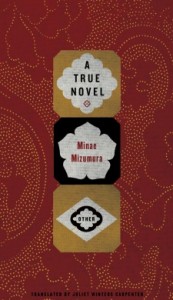
“A True Novel remarkably depicts the sense of isolation that anyone who has lived abroad or moved to a new place experiences. It captures the very human and conflicted desires to simultaneously fit into a society while also desiring to rebel against its impositions.” (Other Press)
By Julio Perez Jr. (Kyoto-shi, 2011-13) for JQ magazine. A bibliophile, writer, translator, and graduate from Columbia University, Julio is currently working at Ishikawa Prefecture’s New York office while seeking opportunities with publications in New York. Follow his enthusiasm for Japan, literature, and board gaming on his blog and Twitter @brittlejules.
This is the story of a poor boy that had the misfortune to fall in love with a rich girl. A classic Gothic tale of romance transplanted and re-imagined in postwar Japan. If you like your lovers star-crossed and your antiheroes of the rags to riches variety, then you’re in for a treat with Minae Mizumura’s A True Novel. Winner of the Yomiuri Literature Prize in 2002, A True Novel is a book filled with familiar themes executed in interesting new ways. It is a re-imagining of Emily Brontë’s Wuthering Heights in postwar Japan, with parallels among some characters, but different enough to be original and uniquely Japanese.
A True Novel is a unique and engrossing tale that brings together three seemingly unrelated characters who are united not only by a resigned sense of isolation from their surroundings but also united in their encounters and fascination with the book’s protagonist, Taro Azuma. The focus of the novel is the story of his tragic youth, a poor boy who falls in love with a rich girl, and his growing awareness that he would always be incompatible with her in the eyes of others. He flees to America, where he claws his way up from the dregs of society and overcomes the obstacles of class and wealth to become one of the richest Japanese men of his time. While we learn about his fascinating life through the three different viewpoints of the characters with their sometimes humanly biased perspectives, the book also gives insight into the complex identities of the uprooted lives of immigrants and refugees both in Japan and in America, as well as how attitudes toward them have changed over time. A True Novel remarkably depicts the sense of isolation that anyone who has lived abroad or moved to a new place experiences. It captures the very human and conflicted desires to simultaneously fit into a society while also desiring to rebel against its impositions.
Mizumura has masterfully brought to life narrators and characters from different generations, countries, and social classes, and provides fascinating insight into their lives during different periods of Japanese history. From the bleak years of Imperial Japan’s home front during the Pacific War, and the humbling postwar period, through its modern economic success, and finally to the bubble burst and recent events, Japanese modern history comes alive in an intimate and immediate way that inspires new appreciation and curiosity for the human side of history.
【RocketNews24】Emotional anime short celebrates Tokyo Station’s 100th birthday【Video】
It’s been 100 years since the opening of Tokyo Station. For many people, it’s more than just a rail hub, it’s a symbol of the city and the lives of those who live in and around it.
With just about everyone in Japan’s capital passing through sooner or later, Tokyo Station serves as the backdrop for a lot of nostalgic memories, not to mention some life-changing events for workers and travelers alike. So it’s fitting that the anime made to commemorate Tokyo Station’s 100th birthday is filled with both comforting looks back at the past and hopeful expectations for the future.
Community Involvement on JET: Don’t Be Afraid to Start From Scratch
By Jayme Tsutsuse (Kyoto-fu 2013-2014), organizer for Cross-Cultural Kansai, seeking work opportunities in NYC starting August 2014!
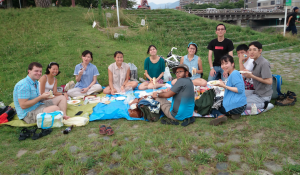
Cross-Cultural Kansai’s Summertime Picnic at the Kamogawa river in Kyoto, celebrating global identities with delicious food, beautiful weather, and amazing friends.
At the JET Program Tokyo Orientation last summer, we were all told to get involved in our communities as much as possible. It seemed like good advice, so I jotted it down in my list of goals, expecting this promise to somehow become less vague once I settled in.
I’m not sure how I envisioned it would happen. Obviously there wouldn’t be a community, gathered with open arms, ready welcoming me in when I arrived. Fair enough. But really, what were we supposed to do?
A friend suggested that I check out Meetup.com, and I was surprised to see how popular it was in Kansai (not nearly as expansive as New York or London, but still!). Every weekend, I’d join events in Osaka or Kyoto, and I never failed to fall deep into conversations with new friends about our backgrounds, where we came from, how it affects who we are today and where we want to go in the future. I loved listening to their stories. And the more I came across these stories, the more I thought about how great it would be to create a space for them, a community premised on sharing these parts of ourselves.
For the complete story, click here.
JQ Magazine: J-POP Summit Festival Returns to San Francisco with Music, Fashion, Film
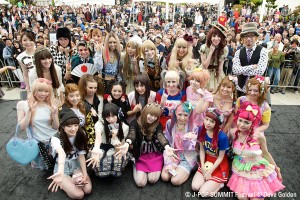
The annual J-POP Summit Festival returns to San Francisco July 19-20, featuring special performances from May’n and Tokyo Girls’ Style. (Dave Golden)
.
By Sam Frank (Wakayama-ken, 2004-06) for JQ magazine. Sam is the webmaster at the Jewish Community Federation in San Francisco.
Japan is a country that likes to borrow from another culture and make it their own. Punk rock, Spaghetti Westerns, and baseball are just a few things Japan has adopted over the years, and in 2009, the J-POP Summit Festival in San Francisco added a bona fide community event to that list. Similar to Coachella, Lollapalooza, and Outside Lands, the J-POP Summit Festival is an annual street fair held in the City by the Bay that celebrates Japanese popular culture. By introducing the latest in Japanese music, film, art, fashion, gaming, anime, food, as well as niche subcultures, the festival has become a prominent platform to showcase the latest trends and creative innovations from Japan.
“POP is our tradition” is the theme this year’s J-POP Summit Festival, which will be held in San Francisco’s historic Japantown district the weekend of July 19-20. Last year’s event welcomed more than 80,000 attendees, making it one of the largest Japanese festivals in the United States. While Japan is participating in America’s summer festival tradition, it has found a way to distinguish itself from the pack. Bringing together food, fashion, entertainment, and film promises to give the people of San Francisco a lasting impression of Japanese culture.
“Each year we strive to present a compelling mix of the hottest entertainment trends happening in Japan right now, and the J-POP Summit has become a wonderful and unique composite of pop and rock music, edgy kawaii-inspired fashion, modern graphic art, and film and anime content,” says Seiji Horibuchi, president/CEO of NEW PEOPLE, Inc. and chairman of the J-POP Summit Festival. “This year’s event promises to be another important milestone for the evolution of J-pop culture and its fan base in the U.S.”
【RocketNews24】Tokyo’s cat pub, the cat cafe for grown-ups
Posted by Michelle Lynn Dinh (Shimane-ken, Chibu-mura, 2010–13), editor and writer for RocketNews24. The following article was written by Casey Baseel, a writer and translator for RocketNews24, a Japan-based site dedicated to bringing fun and quirky news from Asia to English speaking audiences.
In Japan, since so many people who love cute animals live in apartments that don’t allow pets, you can find cafes that’ll let you relax in the company of everything from owls to bunnies. The most common and widely documented are of course cat cafes, but what do you do when you’re craving not only a little feline companionship, but also want something a bit stronger than a cup of coffee?
Simple: you head to the cat pub in Tokyo.
Read more at RocketNews24
JQ Magazine: Film Review – JAPAN CUTS 2014 at Japan Society

Ken Watanabe (right), stars in Unforgiven, premiering July 15 at Japan Society in New York as part of their annual JAPAN CUTS film festival. (© 2013 Warner Entertainment Japan Inc.)
By Lyle Sylvander (Yokohama-shi, 2001-02) for JQ magazine. Lyle has completed a master’s program at the School of International and Public Affairs at Columbia University and has been writing for the JET Alumni Association of New York since 2004. He is also the goalkeeper for FC Japan, a New York City-based soccer team.
This year’s JAPAN CUTS—North America’s biggest festival of new Japanese film—kicks off July 10-20 at New York’s Japan Society, continuing its tradition of showcasing the latest films from Japan along with some special guest stars and filmmakers. This year’s highlights include Japan’s blockbuster The Eternal Zero, The Great Passage (Japan’s submission for the Academy Award last year) and the post-3/11 documentary The Horses of Fukushima. Below are three of the 28 films in this year’s lineup that were made available to JQ at press time.
Eiji Uchida’s Greatful Dead marks the latest entry in the “dark and twisted” Japanese genre. The sordid story follows Nami (Kumi Takiuchi) as she follows “solitarians” (old and psychotic loners) around Tokyo and snaps selfies with them when they die. She enters into a morbid friendship with one particular “solitarian” (Takashi Sasano) and the rest of the film explores the darker side of humanity and mental illness in modern-day Japan. Uchida also seems to be making a statement about those most marginalized in modern Japan—the young and the elderly. Japan’s youth have a staggeringly large unemployment rate while the aging demographic makes for a perilously underfunded social security system.
Also using horror conventions for social satire is Miss Zombie, taking place in a futuristic Japan where zombies can be domesticated as servants and pets. Directed by Hiroyuki Tanaka (here using the pseudonym “Sabu”), Miss Zombie follows Shara, a mail order zombie whose owner, Dr. Teramoto, feeds her rotten vegetables in exchange for domestic labor. The film takes a darker turn as she is raped by two handymen—an event that sexually arouses Dr. Teramoto. Soon, Shara’s services are no longer limited to domestic chores. Even Dr. Teramoto’s wife finds her services useful after their son drowns. Overall, Sabu brings a fresh and interesting approach to the zombie film—a far cry from the works of George A. Romero and the countless imitators he inspired.
Justin’s Japan: Nippon in New York — Kabuki at Lincoln Center, JAPAN CUTS, NY Mets, DJ Krush
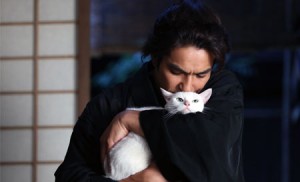
Neko Samurai ~Samurai ♥ Cat~ makes its international premiere as part of Japan Society’s annual JAPAN CUTS film festival July 19 with a live appearance by star Kazuki Kitamura. (© 2014 NEKO SAMURAI PRODUCTION COMMITTEE)
By JQ magazine editor Justin Tedaldi (CIR Kobe-shi, 2001-02) for Examiner.com. Visit his Japanese culture page here for related stories.
After you’ve seen the outdoor fireworks, enjoy some summer events in the cool indoors, whether it’s witnessing the return of one of the world’s most distinguished kabuki companies returning to New York after seven years, catching one of 20 films in Japan Society’s annual festival, or waiting for the bass to drop at a live performance from a legendary DJ.
July 7-12
Rose Theater, 10 Columbus Circle
$45-$190
The Heisei Nakamura-za company, which made its North American debut in a critically acclaimed and sold-out run during Lincoln Center Festival 2004, was founded by the illustrious Kanzaburo XVIII, the late patriarch of the Nakamura family—a veritable kabuki dynasty in Japan with an unbroken line of actors and innovators reaching back to the 17th century. For its Lincoln Center Festival engagement, the company has revived a rarely performed 19th-century ghost story, Kaidan Chibusa no Enoki (The Ghost Tale of the Wet Nurse Tree), about the murder of an artist by a handsome samurai who desires the artist’s wife. Running the emotional gamut from drama to uproarious slapstick comedy, and culminating in a thrilling fight-to-the-death beneath a waterfall, this is kabuki theater at its most engaging. Performed in Japanese with English synopsis via a headset.
July 10-20
Japan Society, 333 East 47th Street
$10-$20
North America’s biggest festival of new Japanese film returns for its eighth year, serving up a thrilling cross section of Japan’s diverse film cultures to New York audiences! Screening 27 features across 10 days, including co-presentations with the 13th New York Asian Film Festival, JAPAN CUTS premieres the best of recent action epics, genre oddities, touching dramas, warped comedies and cutting-edge arthouse cinema made in and around Japan. Plus, meet special guest stars and filmmakers during exclusive post-screening Q&As and raucous parties in Japan Society’s theater and atrium!
Friday, July 11, 5:30 p.m.
New York Mets Japanese Heritage Night 2014
Citi Field, 123-01 Roosevelt Avenue
Special seating $35-$72
For the fifth annual Japanese Heritage Night at Citi Field, the Mets take on the Miami Marlins for this special event. The pre-show kicks off at Mets Plaza outside with an explosive taiko set from New York’s own Soh Daiko, followed by the Mets Spirit Awards inside the stadium given to honored members of the New York Japanese and Japanese American community. Prior to the first pitch at 7:00 p.m., the Japanese Men’s Choir will perform our national anthem. A portion of the proceeds from each ticket bought will go to Japanese community charities through the Japanese American Association of New York. Be sure to look for fun Japanese activities and games throughout the evening at the special tables on the main concourse behind the giant video screen. Price of ticket includes a free T-shirt!
For the complete story, click here.
【RocketNews24】Japanese student’s English homework captures futility of life
Posted by Michelle Lynn Dinh (Shimane-ken, Chibu-mura, 2010–13), editor and writer for RocketNews24. The following article was written by Clara Clegg, a writer and translator for RocketNews24, a Japan-based site dedicated to bringing fun and quirky news from Asia to English speaking audiences.
I’ve marked my fair share of English exam papers here in Japan, and there have been a few gems of hilarity in amongst the spelling mistakes and butchered grammar, but nothing that measures up to this beauty. One student’s answer to a simple question was so deep and existential, it read like poetry.
JQ Magazine: Video Game Tunes Launch World Tour with ‘rePlay: Symphony of Heroes’
By David Namisato (Aomori-ken CIR, 2002-04) for JQ magazine. David is an illustrator in Toronto who spent two years on JET as a CIR while also teaching half of Ajigasawa-machi’s elementary schools. David is best known for Life After the B.O.E., a webcomic and graphic novel he created about the wacky and wonderful experiences of the JET Programme. David is currently working on Mark to Minna (マークと皆/Mark and the Gang) a yon-koma (四コマ/ four-panel) comic strip about the life of Japanese-Canadian boy and his family in Toronto for Torja magazine, a Japanese-language magazine in Toronto, and also on his fantasy action-adventure comic, The Long Kingdom (check out issues 1, 2, and 3). See all of David’s projects at www.namisato.org.
As a child in the late ’80s, I would pause a video game mid-play just to enjoy the music. In the early ’90s, I had the good fortune of having a classmate from Japan who would lend me his CDs of orchestral performances of popular video game music. Music plays such an important role in setting the mood and pace in a video game, and even outside the context of the game, the same music maintains its impact, and is a delight to listen to.
For the past decade, Jason Michael Paul has been producing orchestral performances of video game music. His concerts have toured the U.S., Canada, Europe and Australia, appealing to a wide audience of video game fans. And as Paul said to me in a recent interview for JQ, the concerts are also an opportunity to expand people’s awareness of the art of video game music. Perhaps you have heard of, or even attended one of Paul’s concerts such as Dear Friends: Music from Final Fantasy in 2004, PLAY! A Video Game Symphony in 2006, or The Legend of Zelda: Symphony of the Goddesses in 2012-13.
This year, Jason Michael Paul Productions brings us the rePlay: Symphony of Heroes international tour, which made its world premiere at the Sydney Opera House in March, and its U.S. premiere in Florida on April 19. Performed by a live orchestra of 68 musicians and a 24-person choir, and featuring award-winning music from 16 classic games with all-new arrangements by the original composers as well as the world premiere of new music, rePlay: Symphony of Heroes will thrill fans of video games and classical music alike.
Posted by Michelle Lynn Dinh (Shimane-ken, Chibu-mura, 2010–13), editor and writer for RocketNews24. The following article was written by Casey Baseel, a writer and translator for RocketNews24, a Japan-based site dedicated to bringing fun and quirky news from Asia to English speaking audiences.
The international nature of professional soccer makes for some uniquely compelling individual matchups at the World Cup. Since the event is only held once every four years, during the time between tournaments the members of each country’s national teams go back to playing for their respective, privately owned clubs.
It’s easy to imagine how this could make things awkward for a player who has a club teammate who’s on the roster of a different national team. One day you’re doing everything you can to beat him at the World Cup, but a few weeks later, you’re going to have to go back to working together, no matter how bitterly contested your match in Brazil was.
Sometimes, though, the opposite happens, and these personal connections bring a little extra sportsmanship to the World Cup, like what happened between Japanese defender Yuto Nagatomo and Colombian midfielder Fredy Guarin.
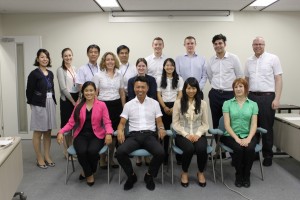
AJET Chair Kay Makishi (front row, left) at the Spring AJET Opinion Exchange Meeting in Tokyo, June 2014. (Courtesy of AJET)
By Eden Law (Fukushima-ken, 2010-11) for JQ magazine. Eden lived and worked in the core city of Iwaki on JET, and is JETAA New South Wales‘s webmaster, meaning he is the voice on all the online and social media for the Sydney-based chapter like Twitter, Instagram (both @jetaansw) and Facebook.
At the start of this year, dramatic changes took place as CLAIR (the Council of Local Authorities for International Relations) formally announced changes to its relationship with AJET (the Association for Japan Exchange and Teaching), with the full details made public by the latter on their Facebook page on a post dated January 27. The immediate outcome of this decision means that AJET’s participation and input at CLAIR-organised events such as the Tokyo Orientation and After JET conferences will be discontinued.
While AJET has had a low profile in the collective consciousness of many on the programme, these changes will inevitably impact all JET participants, most immediately in how conferences will be held and run, and how AJET will continue to represent and assist the needs of the JET community. Historically, the volunteer organisation has existed from the start of the JET Programme and is run by JETs to benefit and support participants in Japan. Now, it faces the biggest challenge of its 27-year history.
For those who may not have heard of or know about AJET, its constitution describes it as a volunteer organisation whose purpose is to foster a successful working relationship between JET Programme sponsors and participants, as well as to promote and support the JET community. In turn, it presents itself as a representative of the same community. Founded in 1987 right from the start of the JET Programme itself, AJET’s early work was very much focused on providing a support network for the first participants.
Kay Makishi (Fukuoka-ken CIR, 2011-14), 2014’s outgoing AJET chair who completed her one-year term on the AJET council, sums up her focus on the JET community: “I wanted to see more energy spent on starting projects like our Professional Development Conference Calls…[and] collaborating more with JETAA so JETs have more support finding jobs post-JET,” she explained.
JQ Magazine: Heisei Nakamura-za Kabuki Returns to NYC This Summer

After a seven year absence, Heisei Nakamura-za brings Kabuki to New York’s Lincoln Center Festival July 7-12. (© Shochiku)
By Mark Frey (Kumamoto-ken, 2002-06) for JQ magazine. Mark served as the editor for JETAA Northern California’s Pacific Bridge newsletter from 2007-11, and is currently chapter president as well as coordinator of the JETAANC Kabuki Club.
A warm thought to heat you up as the Fourth of July approaches: real, live Kabuki is coming back to New York City July 7-12 as part of the annual Lincoln Center Festival.
This is great news for Kabuki fans in America. And if you were ever curious about Kabuki, it is a rare chance to see the real thing in your own backyard. The performance is part of a very interesting project called “Heisei Nakamura-za,” which was started about a decade ago by the late, great Kabuki actor Nakamura Kanzaburo, who passed away unexpectedly at age 57 in December 2012.
Kanzaburo wanted to give audiences the chance to experience Kabuki the way it used to be in the “good old days” of the Edo period. Back then, Kabuki was a popular entertainment for the common people. It featured smaller theaters, a more intimate relationship between actor and audience, and a more festive, earthy, raucous feel. So Kanzaburo started constructing temporary theaters in Japan and around the world that reflected this atmosphere. He extended the mood to the plays he staged, putting a contemporary spin on old classics.
In 2012, this reporter was fortunate enough to be able to see Kanzaburo perform in the last Heisei Nakamura-za theater he constructed, in Tokyo’s Asakusa district. It was an unforgettable experience. Some of the best actors of our day were walking a couple feet away from me on the theater’s modest hanamichi runway. A special energy flowed between the actors and the audience that I hadn’t felt at established Kabuki theaters. At the end of the final play, the entire back wall of the theater disappeared and we enjoyed a beautiful, open-air night view of the Sumidagawa River and the newly constructed Skytree Tower. It was a magical evening.
JQ Magazine: From JET to the U.S. Department of State, Alumni Share Their Stories
By Sheila Burt (Toyama-ken, 2010-12) for JQ magazine. Sheila is a scientific writer at the Center for Bionic Medicine, a research group located within the Rehabilitation Institute of Chicago. She blogs about urban issues and Japan at www.sheilaburt.com, and writes the column “Letters from Japan” for Gapers Block. Follow her on Twitter @smburt.
Many of those who apply to the JET Program, and for several other teaching or translation positions in Japan, have a strong interest in international relations and diplomacy. But how does one transition from being eigo no sensei to a government career in the Foreign Service?
Via email, JQ reached out to three former ALTs who now work overseas for the U.S. Department of State to learn more about how they successfully made the big jump, and how their time in Japan influenced their respective careers.
Katrina Barnas, Consular Officer in Ecuador
Katrina Barnas (Chiba-ken, 2001-02) holds a BS in journalism from Northwestern University and a Master’s in Public Administration from Columbia University’s School of International and Public Affairs. After working for nine years in higher education administration at Columbia, she joined the Foreign Service in 2013 and recently started her first tour as a Consular Officer in Ecuador, where she assists American citizens in Ecuador and interviews other nationalities interested in traveling to the U.S. for tourism, study and work. She has also been an active member of the JETAA community, serving as vice president of the JET Alumni Association of New York (JETAANY) from 2005 to 2007, and then as a founding member of its board of directors from 2006 to 2011. Here, Barnas discusses how she applied to the JET Program on a whim—and how that decision ultimately shaped her future career path.
I wasn’t sure what I wanted to do after college. I had studied journalism but in my senior year, I was no longer sure that was the path I wanted to pursue. I liked traveling and children, so when some of my friends applied for JET I decided to apply as well. It is interesting to look back on it now since at the time I did not have a strong interest in Japan, but now I can’t imagine my life without a Japanese influence.
JET helped make my choice of joining the Foreign Service less daunting because I knew that I had done this before and succeeded. Through JET, I had experienced working in another country—getting beyond just a visit and belonging someplace very different from my hometown, and I knew that although it was going to be different that I could do it.

